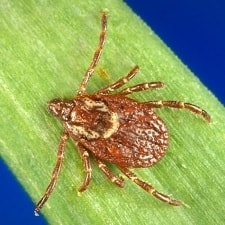Laurie Anne Walden, DVM You probably know that ticks carry Lyme disease. But did you know that ticks also transmit other diseases that can make your pet seriously ill? People and pets get the same tick-transmitted diseases. These diseases are not directly contagious between humans and animals (you won't catch Lyme disease from an infected dog), but we are all exposed to the same ticks outdoors. And one recent study showed that people with pets were more likely than those without pets to find ticks on themselves. Rocky Mountain spotted fever According to the CDC, North Carolina has one of the highest rates of Rocky Mountain spotted fever (in humans) in the country. The disease is caused by a type of bacteria called rickettsia. It is usually transmitted from a tick to its host within a few hours of tick attachment. Symptoms of Rocky Mountain spotted fever in dogs generally begin a few days to two weeks after transmission. Some of the signs in dogs are fever, loss of appetite, joint pain (lameness or stiff gait), vomiting, and bruising of the skin or gums. It is potentially fatal but can be treated with antibiotics. Ehrlichiosis Like Rocky Mountain spotted fever, ehrlichiosis is a rickettsial infection. The Companion Animal Parasite Council reports that in 2016, over 16,000 dogs in North Carolina had positive antibody tests for ehrlichiosis--that is, they had been exposed to the bacteria at some point in their lives. The symptoms of ehrlichiosis in dogs and cats depend partly on the rickettsia species and are similar to those of Rocky Mountain spotted fever. Dogs can also be infected without showing any symptoms. This disease is also treated with antibiotics. Lyme disease Lyme disease, also called borreliosis, is caused by Borrelia burgdorferi bacteria. It is not as common in North Carolina as Rocky Mountain spotted fever and ehrlichiosis, although dogs do test positive here. (These tests do not show where the exposure occurred; some dogs may been exposed elsewhere and then traveled here.) The Companion Animal Parasite Council warns that the disease is spreading and that North Carolina and other states bordering typical Lyme disease areas may start to see more cases. Borrelia are transferred from tick to host a day or more after tick attachment. Symptoms of Lyme disease vary, although fever and lameness that shifts from one leg to another are typical. The symptoms can be similar to those of other tick-borne diseases. Some dogs have no signs of infection. This disease can affect the kidneys, heart, and nervous system and may be fatal. Like the other bacterial tick-borne diseases, Lyme disease is treated with antibiotics. A vaccine is also available. Tick paralysis Some ticks produce a toxin that causes paralysis. The symptoms range from weakness (usually beginning in the rear legs) to a complete inability to move. In severe cases the patient can die from paralysis of the muscles that control breathing. Removing all ticks may be enough to cure the disease. However, some dogs require intensive treatment in the hospital. And others Ticks carry many other known diseases, such as anaplasmosis, babesiosis, and tularemia, and probably some that have yet to be identified. Because tick-borne diseases infect animals as well as people, dogs can act as sentinels for these types of diseases in humans. For instance, a CDC report published in 2011 showed that the incidence of Lyme disease in dogs could predict the risk of Lyme disease for humans in the same geographic area. To learn more Parasite prevalence maps (Pets & Parasites) Tick removal (Centers for Disease Control and Prevention) Ticks (Companion Animal Parasite Council) -- guidelines for controlling ticks on pets August 3, 2017 Image credit: CDC/James Gathany Comments are closed.
|
AuthorLaurie Anne Walden, DVM Categories
All
Archives
June 2024
The contents of this blog are for information only and should not substitute for advice from a veterinarian who has examined the animal. All blog content is copyrighted by Mallard Creek Animal Hospital and may not be copied, reproduced, transmitted, or distributed without permission.
|
- Home
- About
- Our Services
- Our Team
-
Client Education Center
- AKC: Spaying and Neutering your Puppy
- Animal Poison Control
- ASPCA Poisonous Plants
- AVMA: Spaying and Neutering your pet
- Biting Puppies
- Boarding Your Dog
- Caring for the Senior Cat
- Cats and Claws
- FDA warning - Bone treats
- Force Free Alliance of Charlotte Trainers
- Getting your Cat to the Vet - AAFP
- Holiday Hazards
- How To Feed Cats for Good Health
- How to Get the Most Out of your Annual Exam
- Indoor Cat Initiative - OSU
- Introducing Your Dog to Your Baby
- Moving Your Cat to a New Home
- Muzzle Training
- Osteoarthritis Checklist for Cats
- What To Do When You Find a Stray
- Our Online Store
- Dr. Walden's Blog
- Client Center
- Contact
- Cat Enrichment Month 2024
|
Office Hours
Monday through Friday 7:30 am to 6:00 pm
|
Mallard Creek Animal Hospital
2110 Ben Craig Dr. Suite 100
|
Site powered by Weebly. Managed by IDEXX Laboratories

 RSS Feed
RSS Feed